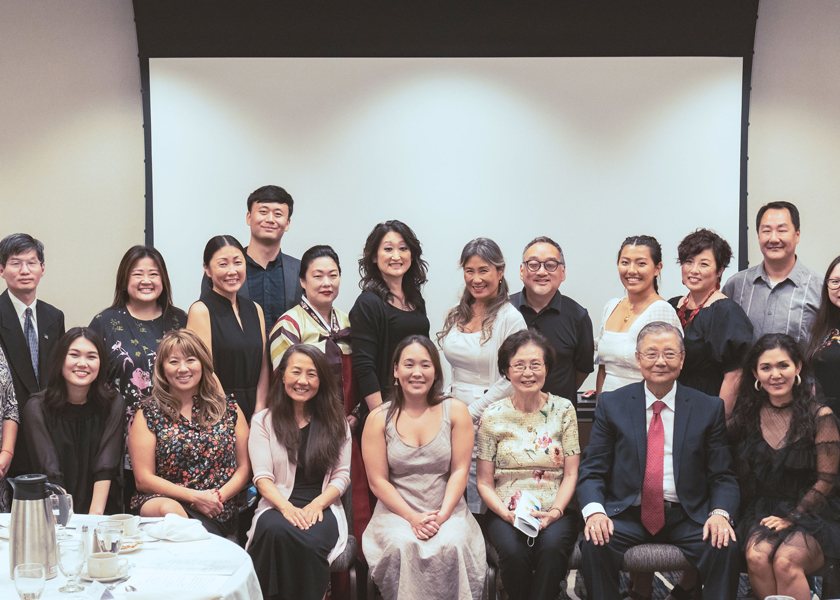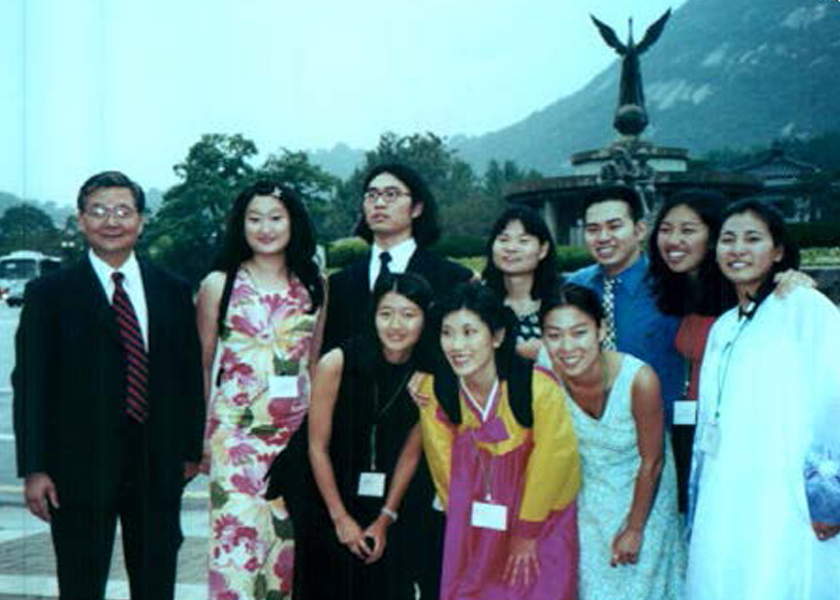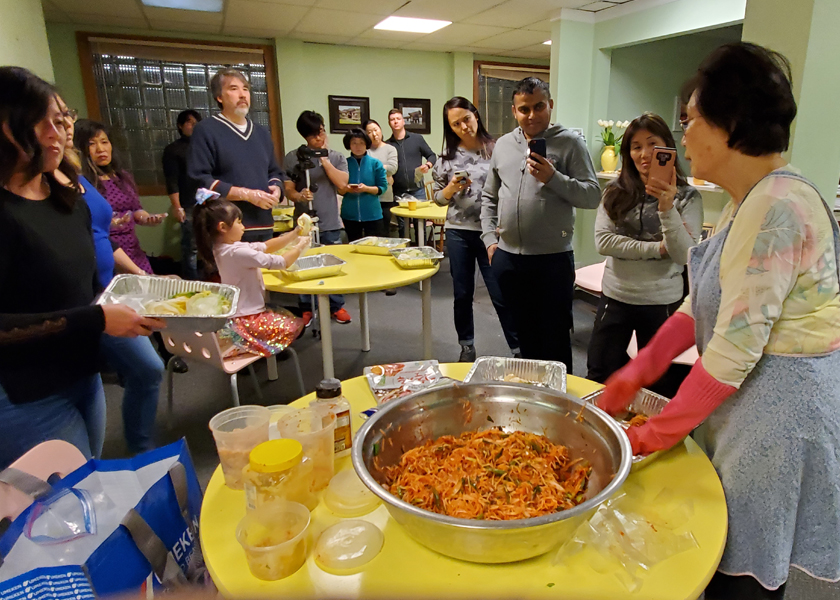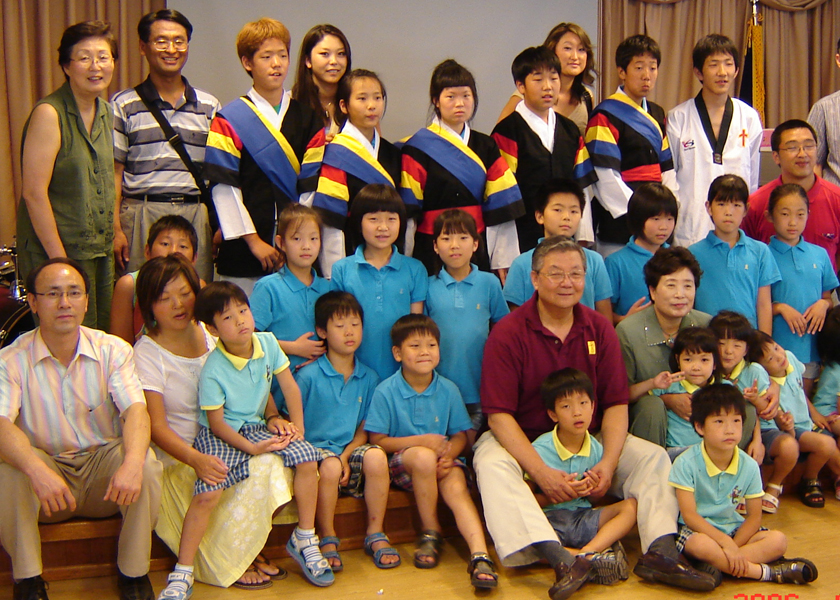After 20 years of counseling, healing and Korea travel, a ministry faces transition | By Martha Vickery (Fall 2021 issue)

Rev. Sung Chul Park wrote a story to explain his lifelong relationship with Korean adoptees into his short self-introduction in the program for the 20th anniversary celebration for the Korean Adoptees Ministry (KAM) Center.
It was about being a five- or six-year-old, in post-war South Korea, on the school grounds, located near an orphanage, playing with classmates long after school let out. Finally, his mother would call him in for dinner, and he would reluctantly leave for the day.
After this scene repeated itself many times, his young mind registered that none of his friends got called by their moms. He eventually understood that being an orphan meant having no mom to call you in for dinner.
The KAM Center 20th anniversary celebration was held October 16 in Minneapolis. The well-attended event drew supporters and past participants in KAM’s 20-year-long ministry from many places. It included a silent auction, performances, and congratulatory speeches. It also included testimonies by KAM Center participants over the years.
Participants’ short speeches revealed how KAM activities, and the annual trip featuring homestays with Korean Christians, has fostered a spirit of belonging to one another, and to Korea. KAM Center takes a Christian approach, where the quest for belonging goes deep, beyond a sense of belonging to Korea and one another, to the quest for God’s grace as well.
KAM Center beginnings
Park’s feeling of not wanting to leave his friends behind stayed with him. A high school teacher in South Korea, he worked as an accountant in Minnesota and was a leader in various capacities at Korean Presbyterian Church of Minnesota. In his late 50s, Park’s career underwent a big shift when he enrolled in a ministerial degree program at McCormick Theological Seminary in Chicago. Ordained at age 60, Park began planning for a new organization to reach out to adoptees.
New immigrants in the mid-‘70s, Sung Chul and Yoonju Park got involved with Korean adoptees through Yoonju’s social work background. She began her work with Korean adoptees by teaching for the Saturday program Korean Institute of Minnesota (KIM), and later at Korean Culture Camp, a summer school for Korean adoptees. As a career, she worked as an adoption social worker for Catholic Charities for many years. From an informal meeting of adult Korean adoptees at her home in the mid-90s emerged the first group for adult adoptees, the Minnesota Adopted Koreans (MAK).
Korean Adoptee Ministries, formed a few years after MAK disbanded, was intended for the same young adult age group. Some of the MAK group objected to the “ministry” label, Park said, but ministry is what they wanted to establish, something with a greater purpose than just getting together socially.
Now age 83, Park says that God made all the key things happen for the ministry. Often things happened in unexpected ways. He met the right people at the right times, and personal relationships have sustained the ongoing financial and programmatic support for the Spiritual Journey.
At the 20th anniversary, Park said that it was his last big event. He has also said he does not plan to travel with the Spiritual Journey program in the future. His most recent trip was pre-pandemic, in 2019.
Recently, the KAM Board, the Parks, and supporters and volunteers have been envisioning the next 20 years. The event included a public sharing of that visioning process. It was a time of celebration but also of transition and uncertainty.

In 2000, Park helped coordinate a partially-sponsored trip to Korea for adoptees, supported by the South Korean government. Park was allowed to send 12 Minnesota adoptees because the government could not easily recruit adoptees from other regions. The idea of sponsored first-time-back travel for adoptees to Korea was modified and became the Spiritual Journey program.
Six of the 12 Minnesotans on the trip in 2000 wanted to stay longer than the end date of the government-sponsored trip, Park said, but they could not afford a long hotel stay. They asked Park for housing help. “I contacted a Korean church about it, and that was the beginning of homestays,” he said.
In 1999, he said, he discussed the idea of homestays with one senior pastor of a large church, Dong An Church, in Seoul. He challenged the senior pastor on the idea that churches had a responsibility to provide hospitality to Korean adoptees, so that they did not have to visit Korea as tourists, staying in hotels and hiring translators, but instead could be welcomed like family members visiting their homeland.
The senior pastor was surprisingly moved, he said, and told Park that he felt ashamed for never recognizing this need before. He quickly promised his help. “In my mind,” Park said, “I thought ‘OK, this is God’s project.’”
Next, the pastor asked Park “Teacher, don’t you remember me?” Park said had a moment of confusion, because he did not remember the pastor from any other time in his past. Then the pastor said his name, “Dong Ho.” That flipped a memory switch and Park suddenly recognized a high school student he had taught years ago. “At that moment, I saw God’s invisible hand.”
Having Rev. Dong Ho Kim committed to providing home stays was a huge benefit to KAM’s plans, because Kim was popular and influential in South Korea, and could persuade pastors in other areas to help too. Remembering him as a quiet and introverted high school student still makes Park smile. “God is very humorous,” he said.
Kim’s successor to the senior pastor position, Hyung Joon Kim, who came in two years later, was also connected with Park through McCormick Seminary; that connection has helped the program sponsorship survive to the present. Kim sent a short video greeting to the October 16 event.

Today’s KAM Center
KAM Center also provides classes to mainly Twin Cities Korean adoptees in well-being topics and life skills. There is a monthly meeting, Spiritual Discovery, that usually involves a Bible study and personal sharing. The group also gets together for Korean holidays, and do a lot of cooking and eating together.
Sometimes, Park said, KAM Center’s work looks like phone counseling sessions that can go on for hours. Sometimes it looks like crisis intervention – a knock on the door in the middle of the night, or a desperate plea for shelter or cash. There has been a toll on their personal lives. “Sometimes we are struggling on where to draw the line,” Park said.
It has also been an uphill battle to promote a Korean adoptee mission to the first generation, both in Korea and in Minnesota. Korean pastors have told Park to his face that Korean adoptees are not “Korea’s problem,” Park said, rather “they are the adoptive parents’ problem.”
Among all the foreign ministries South Korean churches could support, Park said, Korean adoptee ministries does not always rise to the top. Korean adoptees tend to be categorized unfairly as people from wealthy western countries, who are not in need of financial support, he said. But it was not just leaders in South Korean churches who opposed supporting Korean adoptee ministries; his own church members in Minnesota have also challenged him on it, he added.
KAM Center’s programs also include prison (and post-prison) ministry. That program started with Jay Grossman, who one day in 1992 went to a Korean Presbyterian Church event for adoptees and adoptive families. Some years after that event, Grossman was arrested and charged with a felony crime, convicted and sent to prison. Park and Grossman’s relationship began the KAM Center prison ministry. At the KAM Center event, Grossman spoke from the heart on how his life has been profoundly influenced by it.
Jay’s journey
In 1999, scared and at a low point in his life, Grossman said in a later interview, he reached out to Korean Presbyterian Church again while awaiting trial in a Dakota County jail, and asked for a Bible. It was a coded call for help; Park recognized it. He sent a Bible, and he also showed up in person, beginning a mentoring relationship that has lasted to the present.
Grossman said the two connected right away; he perceived Park’s deep care and concern “not only for myself as an adoptee, but as just the human condition of seeing anybody incarcerated and asking ‘How can I help? What’s happening? How can I be involved in your life?’ Park’s attitude was one of “unconditional and non-judgmental love,” Grossman said.
Park visited and counseled Grossman once or twice monthly for many years. During the later years, the visits were less frequent, but the two kept in touch. Park also connected him with other adoptees through writing – correspondence in prison must be by letter. A few adoptees wrote to him, he said, “Just knowing others were out there, and had my well-being in their thoughts and prayers” was very helpful, he said.
At the same time, Grossman was connecting Park with Korean adoptees he knew of in prison, and Park started visiting other incarcerated Korean adoptees as well, after getting the certification as a professional visitor to the prison system. Grossman estimates he met from seven to 10 other Korean adoptees in prison over 20 years.
Grossman said Park’s loyal mentorship was key to turning his life around. Grossman started earning college credits. Through in-prison classes sponsored by Metropolitan State University, and correspondence courses, he eventually earned a degree in psychology. He also worked while in prison in outreach to other inmates, including helping a therapist with classes for inmates on topics like understanding emotions and core beliefs, and managing anger, he said.
After his release, he volunteered with several groups offering outreach to clients with addiction and/or behavioral/cognitive issues. Presently, Grossman works as a director for men’s residential facilities; with people who are transitioning to society after rehabilitative care for addiction, or after release from prison.
Even bigger than the desire to get an education and get a career, Grossman said, was the desire to learn psychology in order to “go on an identity journey for myself – who am I, why did I make the choices I did, how did I develop with the cognitive and behavioral issues I had, and how can I overcome them.”
Within 48 hours after his release in 2019, Grossman said, Park stopped by at his transitional housing residence, and the two talked and shared a meal. These days, Grossman volunteers for KAM Center by counseling Korean adoptees who Park hears of. He contacts them in person, by phone, or sometimes with just a friendly letter of introduction, he said.
Morgen’s journey
Morgen Lindquist of St. Paul, married and a mother of six now-adult children, ages 20 through 28, said she heard about the Spiritual Journey on a Facebook group for Korean adoptees.
She went through the long process to apply, and was happily shocked to be accepted. The group of five women met at a pre-trip weekend retreat and created a Kakao Talk chat group “so we could panic together” about the upcoming trip, she joked. One woman was also from the Twin Cities, two were from other Midwest states, and one was from Germany.
Lindquist said she had no connections with the Korean adoptee community until the Facebook group, although she did enjoy going to the Korean grocery store and cooking for Korean exchange students who stayed in their home. After the trip, she said, “going to KAM Center became part of our regular monthly routine.”
The group told their adoption stories to church groups in each of four cities they toured before going to Seoul for the last two weeks. They took turns, she said, so no one had to speak multiple times. “Some did talk about their faith history, but it was not required,” she added. “Not everyone who goes is Christian, but they were all raised religious, so they were comfortable going.”
Heading north by train after a week in southern Korea, Lindquist said she caught a glimpse of the city skyline of Seoul. “I could only think, ‘wow, I am really back,’ because all I knew was that I was from Seoul. I remember being overwhelmed by emotion.”

During the three weeks, the group went to the DMZ and other famous sites. They also did adoption-specific activities, such as a dinner with mothers who had placed their children for adoption, and an overnight stay at an orphanage. During a three-day mountain retreat at the end of the trip, each of them received a custom-made hanbok, a gift from a supporter. They also got photos taken, individually and as a group, in their new Korean dresses.
Lindquist had little birth search information; she said she knew that most of what was on the record was made up. She was aware that “95 percent of people don’t find their birth families.” Their group beat the odds with three of the five women finding some birth parent link as a result of the trip.
Lindquist related that hers was a failed adoption. Her parents moved 16 times between her second grade and sixth grade. She and her two brothers were removed from their parents’ home when she was 12. She was in foster care, and was emancipated as a teenager. As a result of all the instability “there were certain things I missed,” she said, such as keeping up with school, or having a sense of family.
When she was 18, she said, she met her future husband, Lonnie. “He stabilized me. When we were married 10 years, I realized I had lived with him longer than with anyone else.” The couple have now been married 30 years.
KAM Center has given her an extended family, true to its slogan “We are one family.” There is a bond that exists between people who are adopted and Korean, and she feels now that there are others she can call on. Although it is never pushed by KAM Center, she said, it is suggested to participants that the Spiritual Journey is an opportunity to take stock, “to reflect back on what God may have for you; how you are going to pay it forward.”
Larissa’s journey
Korean adoptee Larissa Bordwell Gunvalson started attending KAM Center events in 2018, a year before her Spiritual Journey in 2019. Sometimes her teenage daughter Xela went to activities with her. Prior to that, she had had some time-consuming things to do, like getting herself through law school, and raising four children with her husband John, an Ecuadorian American adoptee. Before 2018, she said, “I just did not have the emotional bandwidth to really delve into that aspect of myself.”
Her adoptive parents had had three biological children after adopting her, at a time when the mindset was assimilation. They did not think it was a priority to explore her heritage, she said. She had also had not met very many other Korean adoptees. “I think it took many years for me to kind of be comfortable to be around other adoptees, and I think its because there’s a lot of baggage we come with,” she said.
To get a passport for the first time, Gunvalson said, she first had to get a duplicate certificate of naturalization – her parents could not find the original — which was expensive (about $560) and complicated. As a result, there was a time crunch for the passport. “I was glad I had the legal training to get through it, but any ordinary person would definitely have some trouble with this.”
To apply for the trip, she had to submit recommendation letters, interview with the KAM Center board, and then with Pastor Park. There was a retreat with the group before the trip, and one after, and several pieces of required reading.
The tour had fun aspects and emotional ones. She liked staying with the host couple who were her age, with two children. She remembers feeling emotional, after going to an orphanage, staying overnight, then leaving behind the group of fun-loving boys, around five to seven years old, that she had played with.
With some clues gleaned from mementos in a baby book, Gunvalson found she came through the Eastern Social Welfare Society in Seoul. One day, the group went to find their files at agencies, and she found hers. Surprisingly, it contained a lot of information, as though the social worker had done an in-depth interview with her birth mother. It said she was the youngest of four sisters, a piece of information that gave her a glimmer of hope for the future of her birth search. She left without learning anything more, which was fine. “I did not have high expectations,” she said.
The October after the 2019 trip, she got a call from an Eastern social worker, who said that they had located her birth mother. She also found out that her birth mother had declined contact, which was disappointing. Shortly thereafter, she found out that two of her older sisters wanted to get to know her. The oldest sister is disabled and living with their mother. However, the three younger sisters have been corresponding through letters, photos, and chats, and after the pandemic winds down, Gunvalson wants to plan a visit.
She and her sisters have discovered some fun similarities. All three of them had two sons as their first two children. Several of their children play musical instruments – her daughter and her sister’s son both play saxophone. She noticed in a photo that her sister’s choice of a wedding gown style – not a super-common style, she said – was almost the same as hers.
Finding family has been thrilling and hopeful, but she wants to proceed slowly. “I feel cautious and confused about how to build this relationship,” she said. “That’s what grew out of the Spiritual Journey.”
Gunvalson’s daughter Xela Gunvalson spoke at the end of the event about how participating in KAM Center activities helped her connect with a sense of being Korean. She said she wore a hanbok to her graduation, one of only two students who wore a national costume.
Gunvalson said, she wrote on her suggestion card for new KAM ideas that it would be helpful to have an outreach for children of Korean adoptees, who go through some of the same issues as their moms and dads, and may carry some of the same trauma.
Gunvalson said she is grateful she went on the 2019 tour, probably the last one with Park as its leader. “It felt really special too, when he came to my daughter’s graduation party. It was like having someone be there in the place of my parents coming to celebrate the occasion. It was important, because it is oftentimes at those life events, when I feel especially sad.”
At the end of the event, a new KAM Center board member Inah Jeong, discussed some ideas for the next 20 years of the ministry. Some of the ideas include: Reinstating Camp Chin-Gu, a summer Christian retreat for teen adoptees that KAM Center ran from 2001 to 2003; developing a formal program of Christian counseling; finding a permanent office space for KAM Center; and reinstating the Spiritual Journey and the Inner Healing Retreat, after its two-year hiatus since the pandemic began in 2019.
Looming large on the horizon is how to replace Park, who has poured energy into the ministry for 20-plus years, and who has cross-cultural connections throughout the Korean American community and in South Korea. There is no one person in mind at the moment, and no one so far as uniquely qualified. Recently, Park said, he has discussed the executive director position informally with a few candidates.
There are demographic challenges to growth – the largest group of Korean adoptees is older every year. The number of potential participants for this or any organization reaching out to Korean adoptees is growing ever smaller. There is also the question of whether the emphasis could be something other than a ministry, since there are fewer people going to church every year. To the Parks, after 20 years of defending and building up their ministry, that aspect of the organization seems non-negotiable.
Grossman said he understands how the “ministry” part of KAM Center could be seen as a drawback in terms of demographics “because there’s a large part of the population that may not ascribe to a faith-based system, but want to be a part of the connectedness,” he said.
However, he said, how could a non-spiritual peer group-style approach shoulder the spiritual and healing needs of Korean adoptees? KAM would be like many other adoptee organizations, “like ‘we’re all adoptees, let’s get together, share a point of view and connect,’” he said, “but then we’re not going to go deep into our personal lives and change?”
Spiritual growth is “the core” of the ministry, Grossman said, “that it is a faith-based organization, and [we teach] the realization that through God’s love, grace, mercy, forgiveness and healing, we can become a new person and have our identity be rediscovered as our identity in Christ.”


